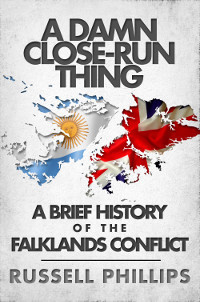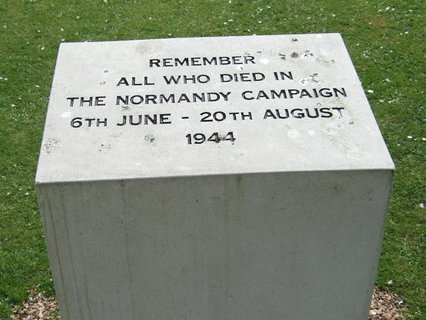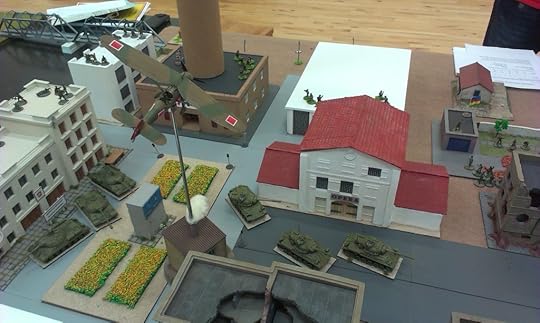Russell Phillips's Blog, page 15
July 7, 2014
Digital Book Day 2014
Monday, 14th July 2014 is the first Digital Book Day. On that day, I and over 100 other authors (108 at the time of writing, and that number is likely to increase) will offer one of their books for free.
I will be giving away A Damn Close-Run Thing. Simply come back on Monday 14th, and use discount code DBD2014 to get it for free.
The post Digital Book Day 2014 appeared first on Russell Phillips.
June 27, 2014
Gavrilo Princip and the Mythical Sandwich
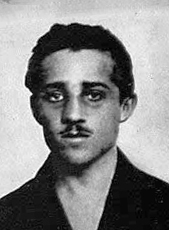 It is generally accepted that the First World War was triggered by the assassination of Archduke Franz Ferdinand by the Bosnian Serb Gavrilo Princip. In recent years, however, an extra twist has been added: that the only reason Princip was in a position to fire at the Archduke was because he happened to be eating lunch when the Archduke’s car drove past. Millions of lives were lost during the war that followed. The Russian Revolution, the rise of Hitler and Nazism, the Second World War, and even the atomic bomb can arguably be attributed to the First World War, and thus, to the assassination of Archduke Franz Ferdinand. It’s sobering to think that all of those terrible things might never have happened if Princip hadn’t felt a little hungry and stopped off at Schiller’s delicatessen for a sandwich.
It is generally accepted that the First World War was triggered by the assassination of Archduke Franz Ferdinand by the Bosnian Serb Gavrilo Princip. In recent years, however, an extra twist has been added: that the only reason Princip was in a position to fire at the Archduke was because he happened to be eating lunch when the Archduke’s car drove past. Millions of lives were lost during the war that followed. The Russian Revolution, the rise of Hitler and Nazism, the Second World War, and even the atomic bomb can arguably be attributed to the First World War, and thus, to the assassination of Archduke Franz Ferdinand. It’s sobering to think that all of those terrible things might never have happened if Princip hadn’t felt a little hungry and stopped off at Schiller’s delicatessen for a sandwich.
The sandwich theory, however, is deeply flawed. The Smithsonian blog published an excellent debunking of it back in 2011. It appears that the original source of the sandwich was a novel by a Brazilian TV host. The post is very interesting, and well worth a read.
When I first heard about this, I wasn’t at all sure how to feel about it. It seemed to trivialise a truly earth-shattering event, and I couldn’t understand why people felt the need to focus on the apparent coincidence of the Archduke’s car happening to go past the delicatessen where Princip was having his lunch. When I mentioned it to my wife, she came up with what seems like a very plausible theory. People have difficulty relating to the event, because they have nothing in common with Princip. People find it hard to empathise with a murderer, and the fact that the act had such incredible consequences makes it even harder to relate. Everyone, however, can relate to eating a sandwich. It’s something we all do, so it gives people something in common with Princip, some tiny little thing that they can relate to, and that makes the whole story easier to take in.
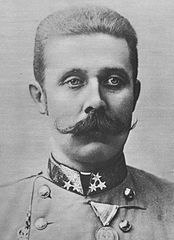 The sandwich is a minor detail, and perhaps it doesn’t matter if such minor details are incorrect. If the sandwich was told as an interesting aside, maybe it wouldn’t bother me quite so much. The problem is that in some accounts, it takes on a great deal of importance, and is said to be what led Princip to be in the right place at the right time to fire the fateful shot. The implication being that, if Princip hadn’t had that sandwich, he wouldn’t have killed the Archduke, and history would have been very different. However, the Archduke had already survived one assassination attempt that day, and even without his assassination, a war was likely. These things are all too easily forgotten when people focus on the apparent bizarre coincidence of the sandwich. Suddenly a major war (and all the events that can be said to have happened as a result of that war) happens just because one man ate a sandwich. If that were true, all well and good, but it isn’t, and so many people get a completely wrong understanding of the events that led to a major war where millions died.
The sandwich is a minor detail, and perhaps it doesn’t matter if such minor details are incorrect. If the sandwich was told as an interesting aside, maybe it wouldn’t bother me quite so much. The problem is that in some accounts, it takes on a great deal of importance, and is said to be what led Princip to be in the right place at the right time to fire the fateful shot. The implication being that, if Princip hadn’t had that sandwich, he wouldn’t have killed the Archduke, and history would have been very different. However, the Archduke had already survived one assassination attempt that day, and even without his assassination, a war was likely. These things are all too easily forgotten when people focus on the apparent bizarre coincidence of the sandwich. Suddenly a major war (and all the events that can be said to have happened as a result of that war) happens just because one man ate a sandwich. If that were true, all well and good, but it isn’t, and so many people get a completely wrong understanding of the events that led to a major war where millions died.
No doubt there will be much written and spoken about the war over the next four years, as the centenary of various events comes around. Let’s make an effort to honour those that suffered by doing our best to get the facts right. It’s not always easy, of course, and an honest disagreement over the correct interpretation of events is perfectly valid, but there’s no excuse for making up stories or coincidences that simply didn’t happen.
Tweetables
Honour those that suffered in WWI: make an effort to get the facts right – Click to tweet
Many people suffered during WWI. Repeating fictional stories as fact dishonours their sacrifice – Click to tweet
The post Gavrilo Princip and the Mythical Sandwich appeared first on Russell Phillips.
June 25, 2014
Business Negotiations Are Not Wars
I’d like to make a request. Can we please stop referring to business negotiations as wars? Amazon and Hachette are currently engaged in contentious negotiations, which journalists are referring to as a “war” between the two companies.

I don’t care what you think about Amazon or Hachette. Referring to a business negotiations as a “war” is lazy, sensationalist, and insulting to everyone that has ever been in an actual war. My wife’s grandfather was in Burma during WWII. My parents lived through the German bombing of Britain in 1940, and my dad later served on HMS Ceylon during the Korean War. A friend was on RFA Fort Austin during the Falklands War. I’m very happy to say that none of them were physically harmed, but they were all affected, and saw things that they won’t talk about. Many people that were involved in those wars were physically or mentally harmed, including civilians and children.
What is happening between Amazon and Hachette is business. It’s people in suits arguing about how much money they each get. It is not a war. No-one is getting shot at or bombed. The veterans of these negotiations won’t need help from organisations like the Royal British Legion or The Forgotten Heroes.
Obviously it’s a metaphor, but I think it’s used too widely and too glibly. War is a terrible business, and when the word is over-used, it starts to lose its real meaning. That leads to people forgetting that war is a really stupid idea, which in turn leads to real wars. Wars where real people are really killed, maimed, and psychologically damaged.
Tweetables
The Amazon / Hachette dispute is not a war. It’s people in suits arguing about money – Click to tweet
Referring to business negotiations as “war” is lazy, sensationalist, and insulting to veterans – Click to tweet
The post Business Negotiations Are Not Wars appeared first on Russell Phillips.
June 9, 2014
Lidice Unearthed

Today is the 72nd anniversary of the destruction of Lidice. Last year, the Unearthed project created a sculpture to raise awareness of, and remember, both the atrocity and the incredible generosity of North Staffordshire’s miners.
The story of Lidice is one that should be shared far and wide. If you don’t know it, see this blog post. If you do know it, tell others. Don’t let the atrocity be forgotten – it’s when we forget that we allow such things to happen again. But also, don’t let the miners’ generosity be forgotten – it can, and should, inspire future generations to be the best they can be.
As well as a beautiful sculpture, the project created a series of videos, which illustrate the story of Lidice.
Lidice Shall Die
This first episode is the documentary that I saw at the Potteries Museum, when I first discovered the story of Lidice and Stoke-on-Trent.
Lidice Shall Live
This is a play that was performed to an unsuspecting audience in the Victoria Hall in Hanley, where the Lidice Shall Live movement was started seventy-one years before.
The Miners Raise Money
After the Lidice Shall Live movement was started, the miners of Stoke-on-Trent and North Staffordshire raised £1,000,000 to help rebuild Lidice once the war was won.
Lidice Is Rebuilt
The final episode is a virtual tour of the Lidice memorial gardens and the new village.
The massacre of Lidice was an act of cold, calculated brutality, outrageous even by the standards of the regime that perpetrated it. It led to an act of outstanding generosity and compassion. North Staffordshire’s miners were living under rationing and still grieving from an explosion at Sneyd Green colliery that had killed 57 and devastated the local community. Yet they still gave a day’s wage each week to the Lidice Shall Live campaign. The dead of Lidice deserve to be remembered, because it is when we forget such things that we allow them to happen again. The miners and Sir Barnett Stross deserve to be remembered, because they reacted with compassion and generosity. In so doing they ensured that the evil did not prevail.
Tweetables
The @unearthed2013 project made 4 videos about #Lidice, showing the incredible brutality and compassion
Click to tweet
It’s the 72nd anniversary of the destruction of #Lidice, a story of brutality and incredible generosity
Click to tweet
The post Lidice Unearthed appeared first on Russell Phillips.
Sale: A Damn Close-Run Thing
The Falklands War ended on the 14th of June 1982. To mark the anniversary, the ebook of A Damn Close-Run Thing will be available at a reduced price all this week.
The post Sale: A Damn Close-Run Thing appeared first on Russell Phillips.
June 6, 2014
For All Our Tomorrows
My wife posted the following to Facebook earlier today. I’m copying it here with her permission, because I think it deserves to be shared far and wide.
This morning I saw a piece of D-Day remembrance co-opted by a racist group asking, in a somewhat accusatory tone “what are you doing for our country and our children?” It was not a call to honour those who fought, or to remember the sacrifices and tragedies. It was a call to join them in fighting their imagined invasion of Britain in the form of ordinary folk doing their best for their families. This is my answer to them.
I am refusing to accept the propaganda of racism and xenophobia. Jealousy and lack of understanding, fed by lies and half-truths, grow into hatred and fear. They foster insults and violence, and escalate to riots, uprisings and invasions. War is born from the selfish beliefs of a powerful few preying on the ordinary fears of many, turning them against those who are a different colour, or hold different beliefs, or are from a different country or even a different town. Only the powerful few find any glory, the rest find the ugly, harsh reality of bloodshed, tears and loss. Everyone who fought for our country, for every country, did so to build a better world. I honour them by continuing that work, by building a better future. I teach my children compassion, empathy and acceptance in the hope that in some small way I can help to prevent them from ever seeing the world shrouded in the stench of war. I do this for the sake of my children and for the sake of all children.
When You Go Home, Tell Them Of Us And Say,
For Their Tomorrow, We Gave Our Today.
Image copyright Stanley Howe and licensed for reuse under this Creative Commons Licence.
The post For All Our Tomorrows appeared first on Russell Phillips.
May 11, 2014
A Damn Close-Run Thing: Now Available As An Audio Book
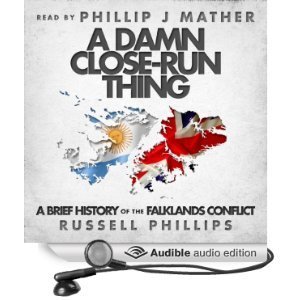
I’m very pleased to announce that A Damn Close-Run Thing: A Brief History of the Falklands Conflict is now available as an audio book at Audible, Amazon and iTunes. It is read by the very talented Phillip J Mather. If you’re not currently an Audible member, you can get a free audio book if you sign up for a free 30-day trial.
You can listen to a short excerpt here:
http://www.russellphillipsbooks.co.uk/wp-content/uploads/2014/04/DCRT-Sample.mp3
Buy it at:
I’m very pleased with Phillip’s narration, but I’ll admit that listening to someone else read my words was a slightly odd experience 
Tweetables
Hear the history of the Falklands conflict – Click to tweet
A Damn Close-Run Thing: Now available as an audiobook – Click to tweet
The post A Damn Close-Run Thing: Now Available As An Audio Book appeared first on Russell Phillips.
April 14, 2014
Battle for Tcherbevan: Crisis Point III
Tcherbevan city centre
Recently, I played in Crisis Point III, a large, weekend-long wargame set in Tcherbevan, capital of the fictional ex-Soviet republic of Andreivia. I had been intending to play Russian naval infantry, but after some last-minute cancellations, I was asked to play Andreivian Turks instead. The Turks are fighting for an independent Andreivian Turkish state, and have a long tradition of enmity with the Andreivian Armenians.

NATO armoured car destroyed by an Andreivian Turk T-55
Saturday didn’t go particularly well. As the NATO peacekeeping force approached from the south, the Andreivian Turks became paranoid, and their T-55 destroyed the French armoured car that was leading the NATO force. Perhaps not surprisingly, this drew return fire from the French, and the T-55′s commander, who had opened his hatch to get a better view of the situation, was shot and killed. Seeing their commander dead, the rest of the T-55 crew decided that discretion is the better part of valour, and left the field of battle. The Turkish quarter of Tcherbevan was attacked by Andreivian government troops (supported by NATO) and Andreivian Armenians.
Andreivian Turk air support in action
As government Type 61 tanks approached the Turkish quarter, Turkish air support was called in. This duly arrived, in the form of a WWII-era Henschel Hs 126 spotter plane. Since the aircraft is unarmed, a brave Andreivian Turk armed with an RPG-7 sat in the rear seat, ready to rain destruction down on enemy armour. Unfortunately, the Henschel turned out to be an unstable platform, and the gunner missed his target.
Government tanks being beaten off by Andreivian Turk infantry
The government Type 61s rather foolishly left their infantry behind as they charged into the Turkish quarter. The ever-gracious Turks gave the government a lesson in urban tactics, demonstrating why armour always needs infantry support in built-up areas, as they immobilised one tank and neutralised a second. As the crew of the first tank bailed out, RPG-7 rounds flew at the second tank, but its crew evidently lead a charmed life, and it survived.
Although things hadn’t gone well for the Andreivian Turks, a band of Mujahideen that had travelled to Andreivia to help had fared much better. As the Armenians fought the government, the Mujahideen took over a couple of Armenian buildings without suffering any casualties.
Andreivian Turk reinforcements
Reinforcements, in the shape of a Gendarmerie squad and a “technical” armed with an AGS-17 grenade launcher, arrived on the second day. NATO, clearly prejudiced against the Turks, brokered a cease-fire between the government and the Armenians, allowing both to concentrate on attacking the Turks. The government Type 61s attacked once again, but this time wisely stood off and fired HE into the buildings, while their infantry attacked. Although the tanks caused some casualties, all the infantry attacks were repulsed.
In the Armenian quarter, a vicious fight over the English church raged between the Mujahideen and the Armenians. Government JS-IIIs lent their considerable firepower to the Armenians, causing several casualties amongst the Mujahideen.

Bubi Three, Andreivia’s entry to the Eurovision Song Contest, flee the city
Ultimately, the Andreivian Turks didn’t fare very well. With NATO brokering cease fires that allowed the other factions to attack them without fear of attack from other quarters, they suffered accordingly. None the less, they put up a hard fight, and conceded little territory. No doubt when Turkey hears how the French were so obviously prejudiced against the Turks, they will start asking serious questions in both NATO and the UN.
I may not have done very well, but I had a great time. The game was good fun, with as friendly a bunch of players as you could wish to meet. All extra money, as well as the proceeds from an auction, will go to Combat Stress, the veterans’ mental health charity. We don’t have a final total yet, but initial estimates are around £50-£60. My thanks to Richard Crawley for all his work in setting up and organising the weekend.
The post Battle for Tcherbevan: Crisis Point III appeared first on Russell Phillips.
April 4, 2014
Improvements To UK Copyright Law
I was pleased to discover recently that, from the 1st of June, format-shifting will be legal in the UK. The change has generally been reported in terms of music – it’s now legal to rip a CD so that you can listen to it on your MP3 player. People have been doing this for as long as MP3 players have been available, of course. Before the advent of MP3 players, it was common practice to copy CDs and albums onto tape to listen to them on personal stereos or in the car. What is more relevant to this blog, however, is that the changes also apply to ebooks.

Under the present law, all these cases, as well as converting an ebook from one format to another, are illegal in the UK. The law is set to change on the 1st of June, at which time converting an ebook from one format to another (from ePub to Mobi, for example, to read it on a Kindle) will become legal. In my opinion, this is long overdue. Many people have been doing it for years, assuming that it was legal, as it has been in the US for many years. As long ago as 2006, the Gowers Review, commissioned by the government, recommended similar changes to the law, but the recommendations were ignored. In 2011, the Hargreaves Review (also commissioned by the government) made similar recommendations, which were accepted by the government, but it’s taken three years for them to be enacted.
Not surprisingly, the new law will only allow copies to be made for personal use. It won’t be legal to make copies for friends and family. There is another important caveat: all of the above applies to ebooks that don’t have DRM, but many do. The UK Intellectual Property Office website states that, where DRM is used to prevent copying, the copyright owner “may have the right to take action against a person who gets round” the DRM. So it would appear that format-shifting DRM’d books will still be illegal, since it isn’t possible to convert them without first removing the DRM. Wherever possible, I don’t use DRM, because it causes problems for legitimate consumers (like making it difficult for them to convert formats) while doing nothing to stop, or even hinder, those who wish to make illegal copies.
The UK Intellectual Property Office has more information on the changes. The “Exceptions to copyright: Guidance for consumers” document (PDF) is particularly recommended.
The post Improvements To UK Copyright Law appeared first on Russell Phillips.
March 28, 2014
Armed Forces Corporate Covenant

The company that my wife works for has recently signed the Armed Forces Corporate Covenant. The covenant is a public pledge, made by a company or charity, to support the armed forces community.
The commitments made are not fixed, but the covenant always includes a core statement of commitment to two key principles:
No member of the armed forces community should face disadvantage in the provision of public and commercial services compared to any other citizen
In some circumstances special treatment may be appropriate, especially for the injured or bereaved
Beyond the core statement, there are a number of options that the signing company can commit to. The intention is that the company will offer support in a way that is appropriate to their situation and circumstances. They can also add commitments that are not part of the template.
As part of the changes introduced with the 2010 Strategic Defence and Security Review, the reserve forces are playing an increasing role in the UK’s defence commitments. Given that, it’s entirely sensible to ensure that they are not disadvantaged. Personally, I find it odd to think that anyone serving in the services (whether full time or part time) might find themselves disadvantaged in some way.
In my ideal world, we wouldn’t need the armed forces. In the real world, however, the armed forces are sometimes called upon to resolve issues. Sometimes I disagree with the decision to deploy forces, but my disagreement is with the politicians, not the servicemen and women that risk life and limb. They shouldn’t be disadvantaged because they are willing to take those risks, and if they need special treatment, they should have easy access to it. Anything less is an insult.
The post Armed Forces Corporate Covenant appeared first on Russell Phillips.


